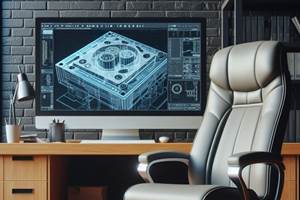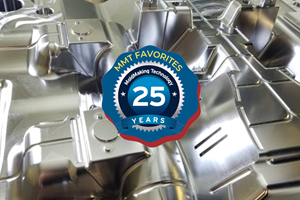Maintenance Matters: The Right Personalities are Key to Reducing Workplace Breakdowns
Building an efficient, successful team with the right attributes reduces the incidents of mold breakdowns.
The rawhide hammer whizzed by its unintended target, missing it by mere inches and bouncing harmlessly off a wall. A stressed-out repair technician threw it, and the shop had a mixed reaction. Some chuckled, others shook their heads in disgust and still others who thought, “It’s all in a day’s work,” just ignored it. Fortunately for the technician, no management witnessed this impulsive act or the emotional episode would have ended in a write-up or something worse.
At another table in the shop, a carelessly installed water hose fitting pops off, effectively drenching two technicians and a half-assembled mold. Now, someone gets to work in wet clothes while the drenched mold is disassembled and dried.
Flying tools and mold components, spraying water and oil and other chaotic incidents are commonplace in shops across the globe. Wherever there is a group of tradespeople who work together in close proximity while they use hand and machine tools on frustrating mechanical items, tempers will flare, feelings will get hurt and emotions will provoke inappropriate responses. The repair technician who flung a five-pound hammer across the shop because a mold would not close after 15 minutes of pounding is a good example.
Team Breakdown
I have worked in and around many shops over the years, including those that send personnel to our mold maintenance training facility, where we witness the interaction between repair technicians from all over the world. From this, I’ve learned that shop culture and healthy personal working relationships are vital for shop success. Just as the right skills, talent and tools yield safe and efficient work, failure to work as a cohesive unit yields an inefficient, motivation-depleting death spiral to an individual or to a shop.
In launching our facility, we assumed that those plying their trade with other repair technicians from different cultures and backgrounds would bring their A game to our benches for fear of looking incompetent. This was not so in many cases. After a few hours of muscling an unfamiliar mold, some technicians began to show their true natures, which were not always pleasant.
This gives us a glimpse of what occurs back at their shops. For example, people have arguments over hourly pay, time off, whether someone is always assigned the harder molds, who overtightens bolts, who has real skills and who is “working” management to get ahead. These arguments are often triggered by the mental and physical frustration of working on unreliable molds or molds that don’t have the proper equipment (overhead hoists, mold splitters, proper bench design, adequate lighting and general shop layout) to make the job easier and safer. The pressure from management or of the production schedule to get molds running and to keep customers satisfied also adds stress. It’s no wonder emotions explode and some suffer behavioral meltdowns.
Team Buildup
Building an efficient, successful team is one way to reduce the incidents of mold breakdowns. Finding the right people, or shop mates, is key. Here are some attributes that best describe a good shop mate.
Affable. High-stress situations occur in mold repair and they call for someone who can help everyone relax when the stress to finish a mold is high. This person is approachable, easy to get along with and does not bring “home” problems to the workplace, which creates additional, unnecessary drama.
Helpful. Tradespeople in the United States are competitive by nature, and sometimes they do not want to share knowledge that they have acquired over the years. That knowledge is considered job “insurance.” For example, a common response to technical questions is often, “Hey, he’s making the same money that I am, so he can learn the way that I did.” In reality, the company paid for that knowledge and experience, so hoarding it has no place in today’s lean shops. Apprentices gravitate toward helpful technicians, even if those technicians are not the most highly skilled, which forms shop alliances.
Careful. Molds are inherently dangerous, as are the tools used to work on them, including the machines, hand tools and cleaning agents. No one wants to work around someone who is dangerous or sloppy in his or her work habits. The repair shop is no place to be inattentive. If a technician observes a dangerous method in practice (whether it is dangerous to a person or a mold), that technician should call it out. Always pay attention to those working nearby and do not assume all is well.
Capable. The skilled technician always sets shop standards for what the rest of the shop wants to achieve. Unfortunately, having great skills does not always bode well for being a team player. Many highly skilled technicians get labeled “prima-donnas,” as they occasionally display attitude toward those in authority.
Honest. Liars, thieves, troublemakers, gossip hounds, loudmouths and bullies are not welcome and should not be accepted in today’s lean, competitive, professional and productive shops. There is nothing more cancerous to a productive team atmosphere than these personality types. Integrity is essential.
Humble. In a competitive shop, the humble technician can help transform a freelancing, tribal shop culture to a team-based culture. This is opposed to the “blow-hard” who consistently degrades someone else’s work, complains about everything and requires constant validation of his or her efforts. The skilled, humble technician is difficult to find, but the cultural benefits of building a humble, skills-rich team is undeniable.
Respectful. Many repair technicians take great pride in owning their tools and tool boxes, which are expensive, require care during use and storage and often are passed down from generation to generation. So, it is not good shop etiquette to borrow tools without the owner’s knowledge, to misuse them or fail to return them in the same condition in which they were borrowed. A shop needs technicians who are respectful of each other and of each other’s things.
Good sport. When something doesn’t go the way that one thinks it should, or a technician is slighted, made fun of in a harmless way or is the victim of a prank, a good sport can take it in stride and not allow it to ruin relationships or affect shop camaraderie.
But above all, building a team of shop mates takes leaders and mentors.
I am not referring to the typical leader who is often associated with management skills. I am talking about being a shop leader. One who leads with the pace he or she sets day in and day out. This person works steadily and smartly and stays focused on the mold. The leader is not distracted by internal gossip and the constant drama over the delegation of tasks. A shop leader can set the tone for daily activities by taking on the larger, more difficult challenges over which others would get cranky.
Therefore, the value of mentors is apparent. It is imperative to have a mentor or two who can train inexperienced technicians, guide them in good decision-making, and show them how to get along with management and how to act properly in difficult situations. Many of those from younger generations did not grow up working on mechanical things, so they tend to get frustrated much faster than their older counterparts. Older, wiser mentors are also open to ideas from younger technicians and don’t stifle new approaches. They acknowledge that ideas and methods from a fresh set of eyes is valuable. Lastly, mentors help younger technicians with life decisions, not just mold decisions. This is important, because if a person is happy in life, then he or she is probably happy at work too.
About the Contributor
Steve Johnson
Steve Johnson is president of MoldTrax, which provides specialized course work, hands-on bench training, maintenance software, maintenance products, toolroom design and maintenance efficiency auditing.
Related Content
Making Quick and Easy Kaizen Work for Your Shop
Within each person is unlimited creative potential to improve shop operations.
Read MoreHow to Foster Innovation Through a Culture of Education, Mentoring
Dynamic Tool Corp. shares its strategy for building a team with the right attitude and aptitude to deliver innovation that meets customer expectations.
Read MoreTackling a Mold Designer Shortage
Survey findings reveal a shortage of skilled mold designers and engineers in the moldmaking community, calling for intervention through educational programs and exploration of training alternatives while seeking input from those who have addressed the issue successfully.
Read MoreLeading Mold Manufacturers Share Best Practices for Improving Efficiency
Precise Tooling Solutions, X-Cell Tool and Mold, M&M Tool and Mold, Ameritech Die & Mold, and Cavalier Tool & Manufacturing, sit down for a fast-paced Q&A focused on strategies for improving efficiencies across their operations.
Read MoreRead Next
How to Use Strategic Planning Tools, Data to Manage the Human Side of Business
Q&A with Marion Wells, MMT EAB member and founder of Human Asset Management.
Read MoreAre You a Moldmaker Considering 3D Printing? Consider the 3D Printing Workshop at NPE2024
Presentations will cover 3D printing for mold tooling, material innovation, product development, bridge production and full-scale, high-volume additive manufacturing.
Read MoreHow to Use Continuing Education to Remain Competitive in Moldmaking
Continued training helps moldmakers make tooling decisions and properly use the latest cutting tool to efficiently machine high-quality molds.
Read More


















.jpg;maxWidth=300;quality=90)







